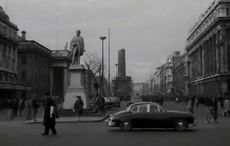Love, grief, hope, and healing are explored with unusual sensitivity by author Helen Cullen in her second novel "The Dazzling Truth."
An Irish writer on the rise, this Trinity College graduate's debut has already been adapted for television.
But Irish writers are having a moment, in case you haven't noticed, and Irish women writers in particular. Book after book keep winning prestigious international literary prizes, with many of them then finding their way to the bestseller shelves and then to film and television adaptations.
So what's behind this renaissance? For many Irish women, the answer is obvious. In recent years, after several fractious referendums, a portcullis has lifted. They mean that in the literal sense, too. The oppressive society their mothers' generation fought against has been consigned to the dustbin of history and the new energy in Irish fiction can be explained by voices that never got a hearing before finally clearing their throats to have their say.
Author Helen Cullen is a good example of the next wave of younger Irish writers to have emerged lately. Releasing her second novel "The Dazzling Truth" (Graydon, $17.99) in the US from August 18 and in Ireland (as "The Truth Must Dazzle Gradually") from August 20, the book is a summer beach read that goes far deeper than the escapist fluff you might bring to the pool but still tells a story so good you won't want to put down.
Beginning in the hallowed courtyards of Trinity College, Dublin in 1978, where aspiring actress Maeve meets arts student Murtagh, the set up is clear from the outset, because marriage and motherhood spell the rapid end of Maeve's career in the Ireland of the period.
How do you raise children and hold on to your dreams? How do you keep faith with the person you were and all the ambitions you had before you became a wife and mother? The book asks that question though the different decades it spans and though the characters we encounter and it doesn't pull punches when it comes to the unforeseen complications of parenthood and marriage.
A Trinity College graduate, with an MA in Theatre, Cullen has a flair for narrative and she knows how to craft it seamlessly, which explains why her first novel The Lost Letters of William Woolf sold for six figures and has already been adapted for television.
I promise I am much happier on the inside than this somewhat crazed photo of me at the An Post Irish Book Awards...
Publiée par Helen Cullen sur Vendredi 2 novembre 2018
With "The Dazzling Truth," the young author is expanding on her early promise with a novel that will batter your heart and mend it in much the same way life does to the Moone family she has created.
This is a book that explores subjects like depression, grief, and renewed hope with its eyes open and is never afraid to look deeply into the heart of life. The Irish have long had a social taboo when it comes to mental health issues, but Maeve the mother in the book suffers from depression and Cullen has decided to tackle it – and the damage it can do to a family - head-on.
“As I was writing the book, I asked my mother what would have happened if he had had postnatal depression with one of her children and she replied nothing, you know, nothing would have happened,” Cullen tells IrishCentral.
“People would just say you had the baby blues and you needed to just sort of shake yourself out of it and get on with things, you know. So it's just remarkable how far we've come recently, that we're beginning to talk about these things. I was very conscious when I was writing the book that I really did not want to infuse the characters of previous times with the empathy and understanding that we have nowadays.”
Cullen's own father's life was also an inspiration. "My father turned 80 the year I started writing it and I was really struck by how unknowable so much of my father’s life was to me. He is of that generation of Irish men who held their counsel on many things and even though we have a great relationship I don’t really have access to his interior world - or know of any disappointments, or sacrifices in his life that he made, any dreams he let go of in service to the family.
"I started thinking about what a huge earthquake it would be in our family if our father were to gather all of his family together and reveal something to us about his private life previously unknown, or that he decided to suddenly embark on a great unexpected adventure without us. And that was the very starting point of the novel for me - and that summoned Murtagh out of the ether."
It's interesting to see a young writer inhabit the ideas and attitudes of an earlier time so confidently, without patronizing her characters or talking down to the reader.
“I'm delighted you think I am part of this new wave of writers,” Cullen says. “I mean for me it definitely started with Edna O'Brian, she was the woman who really broke the back of this in terms of resurrecting silenced women's voices.”
“But there's decades of work that went into so many Irish women writers being able to have this moment now. I mean it feels like a week doesn't go by where you don't hear about another amazing new Irish woman writer coming along, with an incredible book in fiction or nonfiction or poetry, it's an amazing thing to witness and to be part of.”
One of the things that's most exciting about Irish culture right now is witnessing just how central Irish women writers are to the cultural life of the island. It's almost as if it's as there has been a collective decision to tell the story of themselves without fear or favor, and at every level and from every generation of Irish woman. There's this damn burst of truth-telling and literature that's happening.
When readers follow Cullen's character Maeve through the 70s and 80s, some of them may have the wish to rescue her from her own time, where the opportunities for women are few and far between.
“I suppose something that really struck me when I was writing the book was how difficult it can be for women of my generation who consider ourselves to be feminists to look our mothers in the eye and understand the life they've lived and how we might've contributed to them not having had an amazing existence you know, not having the opportunities that are there for us now.”
“And that's something that really rang very true for me when I started thinking of my mother's generation growing up in Ireland and what they have gone through to enable us to go out and have these completely different lives from the way they were brought up. So even though I obviously had felt like that before, I definitely think it gave me a really profound appreciation for the women who have gone before us and what they endured that's almost unfathomable to us now.”
The generational gap, the cultural gap between women of her mother's age and Cullen herself is enormous, she says. “The Ireland they grew up in and the one we have now are just poles apart. In fact, I don't think there will ever be such a divide in the country again,” she says.
Cullen knows that not everyone was on board with the cultural shift that happened in the past or even now. Some women were content to collude in their own oppressions and were happy to extend the courtesy to other women too.
“It can be really hard for people to reconcile the fact that they were enduring their own kind of Stockholm syndrome within the society that they're living in, you know?” The theme of "The Dazzling Truth" is that the truth must dawn gradually, it's best revealed over time, there's no great aha moment, instead, the blinds go up slowly and you're left transformed. You finally in a place to learn the truth of your own experience.
“Absolutely. And I think reconciling that with what your familial expectations were or what the expectations of the people around you were is a massive journey that people have to go on.”
“It's often too hard to confront some of these things head-on. You don't just wake up one morning and realize, “Oh gosh I need to leave my marriage” or “I need to change my career now.” I think the truth kind of creeps up on us and is revealed when we're ready for it. That's why I have titled the book the way I have."
"Even if it's something that you've been kind of fighting against and pushing against for a long time, the truth then kind of sets you free I think. That's the story of what's happening in Ireland now.”
"The Dazzling Truth" will be launched virtually on August 20 at 2 pm EST. To join click here.
Looking for Irish book recommendations or to meet with others who share your love for Irish literature? Join IrishCentral’s Book Club on Facebook and enjoy our book-loving community.




Comments